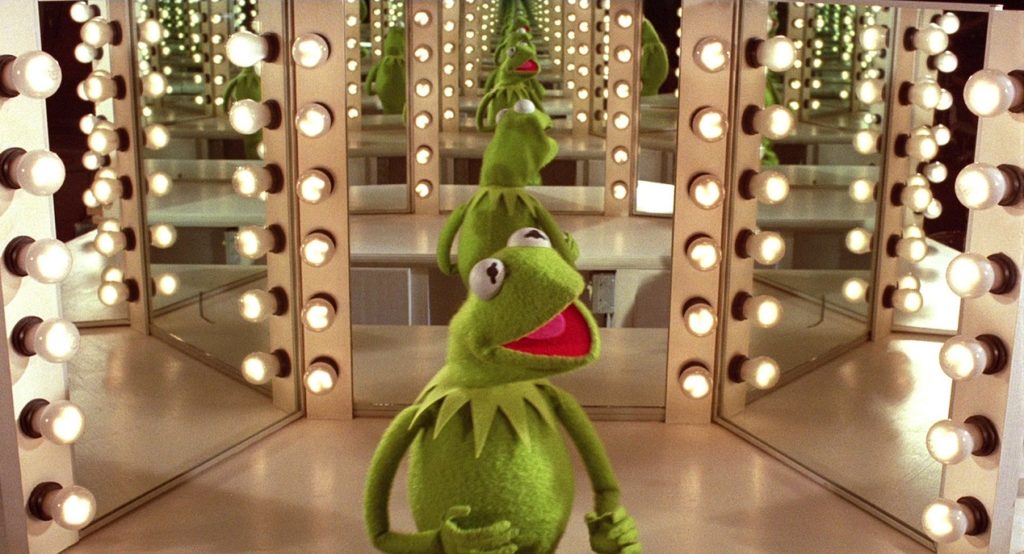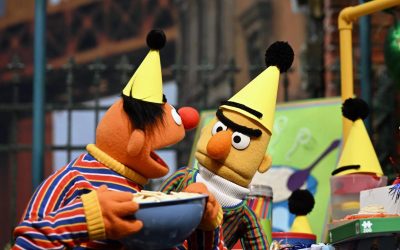David Bizzaro is a puppeteer and puppet wrangler who has worked with The Muppets and Sesame Street, and has taken over the role of Mochi in Netflix’s Waffle and Mochi. We sat down with him to discuss puppetry, Steve from Blue’s Clues, and taking over the little pink ball!
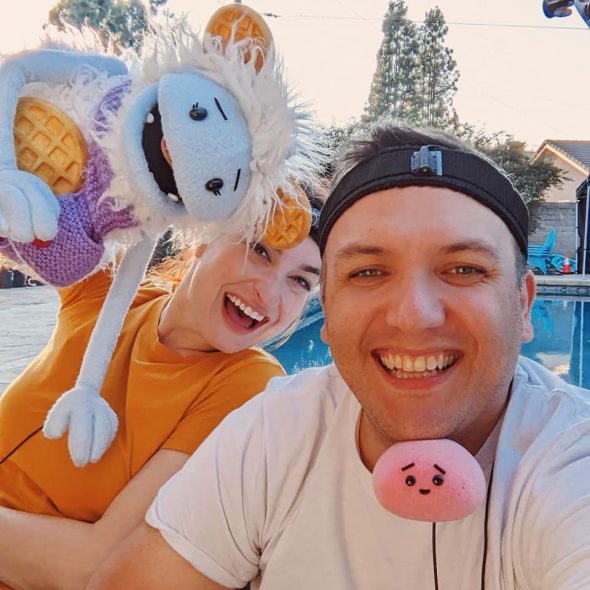
TOUGHPIGS: David, thank you so much for joining us here today.
DAVID BIZZARO: Yeah, of course. Thank you for having me. This is great.
TOUGHPIGS: So I was looking at your credits on Muppet Wiki, comparing that to IMDb, and you’ve done somewhat different stuff besides puppetry.
DAVID: Yes.
TOUGHPIGS: Puppet wrangling and puppet building, writing, independent filmmaking. Were you interested in puppetry first and then that broadened, or were you first interested in film and TV and then specialize in puppetry?
DAVID: Yeah, I was interested in acting first. That was the first thing I did and my focus was in theater because that’s what was available to me when I was a little person. I started as an actor when I was like 16 and that eventually evolved into doing, you know, like local TV commercials and stuff like that. And of course watching films. I really fell in love with filmmaking and especially with comedy, you know. The first comedic influences of mine were Mel Brooks and Gene Wilder. And, you know, I was eating up National Lampoon movies when I was a little kid. They did not age well at all.
But, you know, at the time I was really just like enamored with comedic acting and character acting specifically. And so I pursued that as I got older, but it didn’t quite work out for me. This isn’t so much of a thing anymore. It’s changed a whole lot on our industry, but I… What is the word my wife told me the other day? It’s like, oh… “ethnically ambiguous.” I’m ethnically ambiguous.
TOUGHPIGS: Oh dear.
DAVID: Yeah, and that’s like a real thing. I’ve heard other actors say, “Yeah, I get hired for really weird parts because I’m ethnically ambiguous and, you know, I’m Latino.” My mother came to this country from El Salvador when she was 16. She was fleeing a civil war and central Americans, you know, every different Latino has a different culture and may look very different because of the different historical background, and that’s true to any culture.
Even if you look at Asian Americans, depending on who you’re talking to, like, wildly different culture and different types of appearances and whatnot. So when people saw me and I would audition for Latino characters, they’d go, “Hmm. Well, just so you know, this is for a Latino and you’re white.”
It’s like, no, actually, nope. Sorry. And then I would leave and it’s okay. They think I look white. Let’s go audition for a white part. And I’d get there and they’d go, “You know, this is for a…” Like, without even saying it. “This is for a white person. Like, great. So what do I do?
And I was really just hardened by that, and so I decided that I would get behind the camera and I started learning how to be a camera operator. And I started learning how to edit. I started working behind the camera when I was 16. My stepfather at the time was working for a production company and he convinced them to hire me to go do a documentary.
So I went along with them and was shooting documentaries all over the country as a camera operator and really enjoyed that aspect of it. As I got older, when I was in college, I found a friend who had a camera and a lot of free weekends and so we started making stuff on our own.
Really stupid stuff, you know, like we made a video where we pretended that our “handguns,” like our literal hands that we made into the shape of guns, were real. And we did like a shootout scene in our apartment and we did a kung fu spoof and like all this weird stuff. But what eventually happened is I was, while I was in college, I came across a guy that was working for this band called the Flaming Lips, and he was doing like their backing videos and motion graphics and stuff and they needed some assistance.
While I was talking to him on the phone, I was asking the team questions about animation and visual effects because I was interested in it at the time and teaching myself. And he was like, “Well, if you know anybody that wants to come and be a part and help us out, we can’t pay them, but we’d love that.”
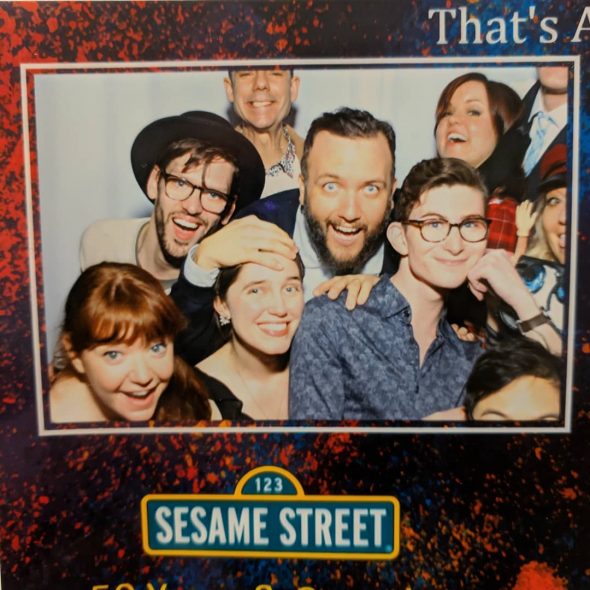
I was like, “Oh, well actually right now in school, I have to get an internship somewhere.” That’s similar to what I’m doing. I was studying at the Academy of Art. It was one of the first schools that offered online classes. It says “art school based in San Francisco.” And I couldn’t minor in animation, so I was double-majoring. I was majoring in traditional illustration and animation, and I was like, well, this goes in line with what I’m studying. So I was like, “Well, just hire me.” And so they hired me and that led me into working for the Flaming Lips for about four years.
There was a point where they were like, “We can’t pay you anymore.” And I just was like… [laughs]
I looked at them, and… When you’re young and naive, you just will say things, you know? And I was like, “Why don’t you just pay me?” Like, what kind of a statement is that?
They were like, “Well, but… we can’t pay you.” Nice, but what if you just paid me? They’re like, “Okay, we’re gonna come back to you and let’s just call you back. We’ll call you back.” A week later they’re like, “Okay, we’re gonna hire you but all we can pay you is 10 bucks an hour.”
I was like. “Great. Done.” I took the job and it was an awesome four years. I learned how to do on the road, down and dirty shoots. The attitude with the Flaming Lips is very much if you don’t have it, you don’t need it.
And that’s really true within the indie music scene, he punk music scene. With a lot of the music scenes, that’s how it is. “Oh, we don’t have someone that can print cool posters for us; we’re gonna get a single sheet of paper, cut out things from a magazine, write with our own hands. And then we’re gonna Xerox it at Kinko’s and that’s gonna be our posters and flyers.”
Don’t have it, don’t need it. So I really learned how to just grab what I had and try to make the best thing I could with what I’ve got and that led me into making my own films and learning how to make my own stuff quickly.
I had a YouTube channel called Bizzaro Studio and I was doing this show called The Bear Show and we were shooting something that looked really high budget, but we were shooting on a couple of DSLRs and some not-so-great lights in my buddy’s apartment. But because of that experience, I knew how to quickly put things together in a really beautiful way.
TOUGHPIGS: Excellent. Wow. You said that wasn’t your puppetry journey.
DAVID: Not my puppetry origin story, no.
TOUGHPIGS: How did that become the main thing that you’re doing?
DAVID: After I left working for the Flaming Lips, I was in between jobs, trying to figure out what to do and at that time in my life — I’m still this way now. I will obsess about an art form that I’m curious about. And if I’m not careful, I will push everything away and do this new thing. Over the pandemic, I had no work and so I taught myself how to make clothes. And now I make clothes. I’m mocking up a jacket that I’m gonna make myself. If I allow myself, I will obsess and I will learn that thing.
I made a rule at that time in my life: I can’t obsess about a new art form unless someone’s gonna pay me to do it.
TOUGHPIGS: That’s a really good rule.
DAVID: Right? And I was very much into gamifying things for myself. This was my mid-20s. ‘Cause I knew that was like the only thing that would work for me, to keep me from really going crazy.
So I made this rule and I was watching these videos. There’s a company, I forget their name, they’re based in New York, they were doing some puppet videos. [Muppet performer] Tim Lagasse is in one of their videos and it was like this title sequence thing. Him and James Godwin did these puppet characters for like these this graphic arts award ceremony.
I was watching it for the graphic arts, right? I was a graphic artist and I was watching for this. They use these puppets and I really was enamored by the characters and how the puppets didn’t necessarily look like… They were Muppet-style puppets but they didn’t look like Muppets. You know, like they took a different approach to them and I really liked it.
So I sent this video to a potential client because I was in between jobs and I was like I need to try to generate some work and they looked at it like, “This is incredible. Can you actually do this? Can you make this kind of a video?”
And I completely lied and said, “Yes. Absolutely, I can do this for you. I can make a puppet commercial for you.” So I had to learn how to build, write for, shoot for, and perform puppets in about a week. It was pretty intense. But I work really well under really tight deadlines, and under a lot of stress. I really moved quick. I didn’t know who he was at all at the time, but I reached out to James Hall and because he had a website at the time blog site called Everyday Puppet, or something like that.
He was trying to build a puppet every day. I was trying to find how to build puppets and I emailed him. I was like, “Hey, I’m trying to figure out how to build a puppet. I just downloaded these puppets from Project Puppet or these patterns from Project Puppet. Am I doing it right?” And all he wrote back was, “Yep, that looks right.”
Now would it look like a professional, TV HD quality, Sesame puppet? No. A million percent no. I was using hot glue and I didn’t know how to sew and so some of the seams were hot glued. It was really bad. And looking back at that commercial, you know, I produced it and made it and I’m really proud that I put the thing together. But looking back on it, it is not my best work. But it was my first work and I’m proud of it for that, that I pushed myself to do it. But what ignited within me was that I really enjoyed this art form. I had found a way to connect my acting with my love for animation.
It was a way of being able to perform and create these strange, absurd characters and have it happen immediately. I didn’t have to wait to render something or move some key frames and then go, “Actually does he look sad when he’s walking or does he just look like he has to go to the bathroom? I don’t know which one it is.” So I loved it.
At the time I was also dating my now-wife, my then-girlfriend. She was moving to New York and I was not sure where I was gonna move. I knew I wanted to leave Oklahoma which is where I was living at the time. I decided to move to New York with her and we moved to New York and I just hit the ground running.
I went to the New York Puppetry Guild and I met Kathy Kim there. That’s where I first met her and a few other puppeteers. Her and I hit off really well and we started meeting once a month. I was building puppets like a crazy person in my apartment and she would come over and we would like play with puppets.
Then I got connected with Puppet Kitchen, which was… is still a puppet studio in New York, but at the time, they were based in an actual kitchen in Alphabet City.
TOUGHPIGS: Oh, wow.
DAVID: Yeah, it was really cool. It was kind of the hub for all of the beginner, up and coming puppeteers in New York City. We started doing monitor nights there, where we would get together once a month and we would just work and do drills [practicing puppetry with monitors] and we would say, “Well, what is it we want to work on?” We’d work on that.
I eventually decided, if I want to be serious, I need to go all-in and I need to stop doing motion graphics. I’ll freelance it on the side, but I need to really go all in. And I, through puppet kitchen, became friends with Liz Hara who is a puppeteer and writer and builder. She’s absolutely brilliant and I really owe her and Michael Schupbach a lot because they’re the ones that really connected me and put me into the veins of the New York kind of Muppet scene.
What Michael did for me was he taught me a lot of the building skills. He taught me how to flat-pattern and it was my first connection to how to build like a Henson Builder. And then Liz and I became friends and we would, every month, get together and eat breakfast together in the mornings because we both like to get up early. We still do Zoom meetings. We call and we check in and we like talk and kind of what are we frustrated about? What’s making us mad about the industry? What’s making us happy? What are our successes? What are our losses? We just try to support each other and just kind of check in, right?
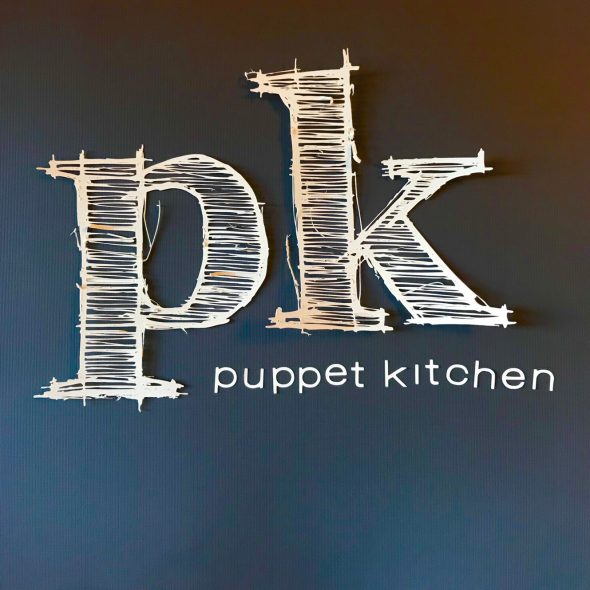
There was a day, I was with her at breakfast and she was like, “Well, how’s work going?” I was like, “Well, it’s going fine. I’m doing some work at Puppet Kitchen.” I said, “But I feel like I’m hitting a plateau. I really need to work more in like a higher level shop.” Not that Puppet Kitchen isn’t a higher level shop. They are. I just felt that I needed to work at a shop that was working in TV and film, because I really had, and really still do of course, have a really big passion for TV and film puppetry. That’s really where my heart is.
She was like, “Well, you know, I work at Henson sometimes.” Or she was working regularly at the time. She was like, “Let me connect you with the shop manager and maybe they could hire you at some point.
She’s like, “Well, just so you know, whenever the hire someone new they do, the not-fun stuff like building arm rods or just sitting there and dyeing Big Bird’s feathers.”
Now that sounds cool, but it’s a really hard job and it’s not fun. Like after your like 30th feather and you’ve got like a thousand feathers, it’s not as fun anymore. It’s really, really tiring.
TOUGHPIGS: I’ll bet.
DAVID: To be fair. I’ve never done it. I’ve never had to do it but I heard about the process and I was like, this sounds awful and I’m so glad I didn’t have to do it. But I went for an interview, showed them my rinky-dink puppets. I pulled them out of a bag and I was like, “I build puppets. Look at this cool puppet.” As I’m like looking over at Oscar the Grouch and Snuffy, I’m like, “Look at my puppet.” And you know, they were really kind and wonderful and they’re like, “You know, we don’t have any work for you right now, but your work is really interesting. You have all these different skills that would be really useful for us. We just don’t have anything for you right now.”
Then like a month later, we got an email at like six in the morning and they said, “Can you come in today and start working for us? We need just extra hands.” I went in and I was assisting Bonnie Erickson. It was terrifying because she’s a legend and they were having me doing costuming, and I’m not a costumer and barely knew how to use a sewing machine.
But they started inviting me to do wrangling. One day, they were like, “We need someone to help us puppet wrangle and we can’t really train you yet because there’s no one train you, but we need just somebody to be there on set. Can you do it?” I was like, “Yeah, sure.”
I think this has changed, but at the time they’re like, “Just so you know, most people don’t like puppet wrangling. It’s not something people like.” I think the reason for that is because it’s very long hours. You work 12 to 18 hours, you’re on your feet all day, and a lot of it is standing around and watching. Which is great, but it’s also unloading and loading boxes and you’re basically a roadie, in some respects, to the puppets. But you also have to be a highly specialized builder that builds in a matter of seconds.
But I was like, “Sure. Yes. If that’s gonna get me on set, yes, I want to do that.” The first day I was on set, I knew immediately this is where I need to be right now because I’m learning really specific things, like how to sew a seam shut from the outside and tie the knot from the outside and then hide that knot.
I’m sure if anyone’s reading this, they’re thinking, “Oh yeah, just do the Henson stitch.” Well, first off, Henson stitch doesn’t exist. I was told that straight from [Henson workshop veteran] Rollie Krewson. It doesn’t exist. Someone else is probably thinking, “Oh, just do the ladder stitch.” You’re right. But there’s also some other moves that make you able to hide that stitch really quickly. Abby Cadabby, for instance, to do an outside stitch on her fur is really difficult because it’s kind of a minky fur and it’s not completely even and thick like an Elmo fur. So you really have to be delicate with how you stitch your stitch closed.
I was learning stuff like that, but also watching the performers perform. I was watching them work and what I realized was that I put myself in a perfect position to take notes and so I started doing that. Usually there’s one wrangler back at the back of all the puppets, and there’s another wrangler that’s up by the performers, in case the performers need anything in the moment.
We’re usually covered in needles and tape and thread, and we’re ready to do whatever needs to happen, and you feel like a Navy SEAL. It’s kind of awesome, but that also put me next to them. I also kept a notebook in my back pocket. If I saw someone do something performance-wise, character-wise, or even technically that I was like, “That’s something I need to remember and try at home,” I would write it down.
Sometimes I would draw picture of where their body was positioned or what they might be attempting and I would go and try it. I didn’t do this as much, but I probably should have, but I would sometimes then watch the episode and see how it looked different within the edit. That really helped me grow and because I was by the puppeteers, I was also able to talk to them.
I didn’t ask them questions like, “Oh, how did you do this? How did you do that?” I just was able to learn how they were as a person but also how they were as a working professional on set which is another really important part about being a professional puppeteer — how you conduct yourself on set with the people you work with.
But yeah… That was my journey into puppetry but also into being able to work on Sesame Street.
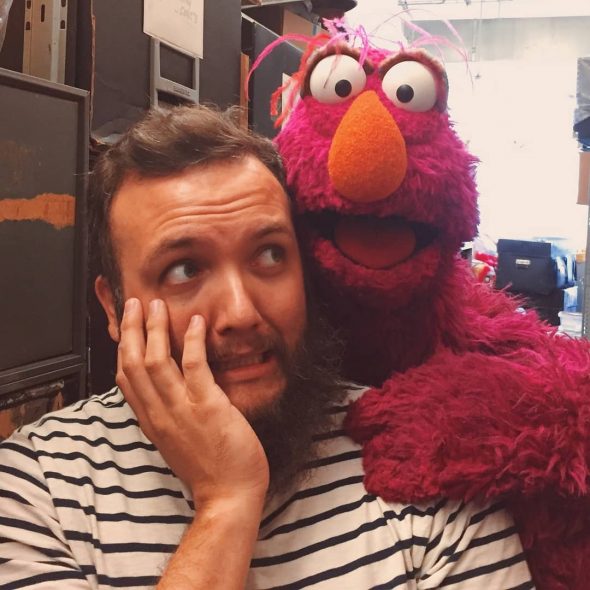
TOUGHPIGS: Gosh, what a joy. So how did that lead you into getting hired on Waffles and Mochi’s Restaurant?
DAVID: I wasn’t on the first season but I was talking with them about possibly working on it. They found me on Instagram, which I thought was really interesting because as artists we can often feel discouraged by being on social media.
To be fair, a lot of people use it just to show how awesome their life is, or just to get views or likes or followers or subscribers or whatnot. While that can be really unhealthy, that doesn’t mean you have to use it that way.
That’s the way I started approaching it because it did get a little unhealthy. It did. I was thinking I had to post like three or four times a week and I had to be liking other people’s stuff and commenting on it. My wife helped me… She was like, “Just post when you have something and post when you actually want to.” I was like, “Great, I’ll do that.”
When I was learning from Michael Schupbach, I was asking him, “How do I get seen by productions? And how do I get people to see me as a serious professional that can be hired for a show? Not just somebody who’s a hobbyist or is just making random stuff on the Internet?” And he was like, “Honestly, just put it out there. That’s all you have to do is just put it out there and tell people that.”
I was like, “Okay. Well, this guy, who’s a professional, who has his own studio is saying to do that. Okay, I’ll try that.” And so that’s what I was doing Instagram and with The Bear Show.
With The Bear Show, the point of the show was to make something that I would love to watch. I wasn’t making it for really anyone else but me and my friend. We were just making it together so that we would giggle and have fun, but I was also using it to grow and showcase the work that I was creating.
So if anybody saw it, they could be like, “Oh, this guy’s actually making stuff.” I’ve been doing the same with my Instagram as well. I’m doing a thing right now… I started making it because I built this puppet to practice my live hand puppetry because I don’t get a lot of opportunities to practice it. But also, he’s really big. He’s a big, large-headed puppet. When you’re performing a larger puppet, you can’t… Closing the mouth quickly is very difficult. And I find that for me, I have to think about my lip sync in a different way. And so me making those videos forces me to try to figure out how to make it look right, because I have to post it.
Me posting those online is A) I’m working out stuff that I’m trying to learn. Like any video I post, I’m trying to work something out and trying to learn something or discover a new way of performing for me, and B) It’s to show people that I’m working. That I’m actually trying to like get better and I’m trying to improve and that I take my craft seriously.
I think because I had that mindset, Erika [Thormahlen], one of the co-creators of Waffles and Mochi, she saw me on Instagram. All she searched for was puppeteers and found all these different puppeteers. And I was one of those puppeteers and she saw my work and was like, “This guy is performing in a way that is interesting to us.” And we started talking. Didn’t work out for season one because they could only hire locals in LA and I was in New York at the time.
So a year goes by. We keep in touch through email, which I highly recommend any performer. If you get in contact with a production and you hit it off with them, email every like six months. Just say, “Hey, how you doing?” Don’t be weird about it, just be like, “Hey! What you up to? Hope things are great.” You’ll maintain that relationship so that when an opportunity comes up again you might get considered and that’s what happened with this.
I went out and did the Jim Henson diversity workshop. That was a year ago. And when I was headed out, I emailed Erika and I said, “Hey, I’m going to be in LA. You’re in LA. Let’s get coffee and check in and just say, hey.” She was like, “Oh my god, you’re gonna in LA. Okay, I need you to meet with my producer for Waffles and Mochi. I want you guys to meet and talk.”
I was like, okay, weird. We met up and she says, “We’re taking the show in a new direction and we want to bring in new people. We’ve really wanted to bring you in. We wish we had you for season one. So we want to bring you in.” And she literally said, “What do you want to do?”
I was like, “Oh, well, I’m doing this workshop and also I’m really just focusing on being a performer right now. I am still interested in directing and writing and I do that for my own work but I think moving forward, right now, in this moment, I’m really loving performing, and that’s really where I want to stay at this moment today. It might change tomorrow.”
She was like, “Great. Performer. Awesome. We would love to consider you for Mochi but you’ll still have to audition.” And then I did the audition and got hired. And so that’s how I got connected with the show.
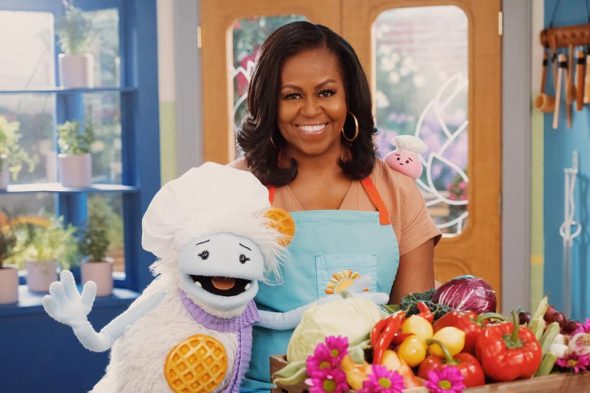
TOUGHPIGS: Were you able to work with the puppeteer who had played Mochi on the first season?
DAVID: I did not.
TOUGHPIGS: What was it like to take on an established character especially such a unique character?
DAVID: Really unique character and really unique puppet. When you see kids making the popsicle stick puppets, that’s just like a piece of paper person on a stick. That’s pretty much what Mochi is. He’s literally a ball on a stick.
I was able to get a puppet from the production a little bit early. I watched the season and really tried to kind of zero in on what Russell [Walko] was doing beforehand. And they had a different voice actor do the voice for Mochi.
So Russell didn’t do the voice — or he did the voice, but then they recast the voice with a voice actor. Not that the performance was disconnected or anything. It was more that I was trying to infer what Russell was doing with the character just from his movements and also taking notes from the production as well.
The thing that I added was I made him a little bit more rebellious, just a tiny bit. Like a little bit of a rebel streak in him. But I also thought that just speaking in meeps and moops wasn’t enough. I like it and I know that Beaker only speaks in “meep, meep, meep, meep.” I think that’s great, he’s a little ball. He’s a little mochi thing and when you eat them, they really squish and tear in interesting ways and his mouth is just little tiny thin flaps. He’s got to do more.
This was actually a Flaming Lips approach, which is: Don’t ask for permission, just do the thing and then beg for forgiveness afterwards. That’s what he would do. Or even Mel Brooks said that a production would come in and be like, “Don’t do this.” The executives would say, “Don’t do that thing. We don’t want to do it.” And he’s like, “Of course. Yes, we won’t do it. We’re not going to do it. We’ll never do it.” And then he would do it anyway and put it in the edit and then the executives would be like, “Oh, okay, now we get it. Okay, right, this is right.”
So when I first was kind of demo-ing what I was thinking of doing with the character they were like, “We love what you’re doing, but we need to hear more meeps and moops.” I took that and put more meeps and moops in, but over time I gradually started adding more just kind of nonsense sounds and not-nonsense sounds. Sounds that made sense for what he was doing in the moment. Like phbbt and laughing.
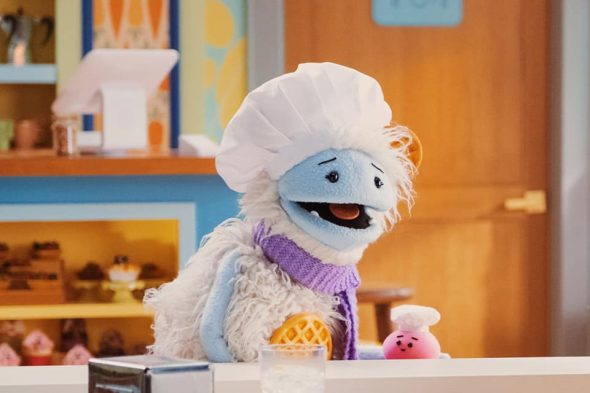
There’s a shot they kept that, I’m so happy they kept it in. They’re competing against what’s better: chocolate or vanilla? And there’s a point to vanilla and Mochi just goes, “Heheheheh.” Just slowly turns and kind of gives a cackle laugh. It’s really sweet and funny because he really cares about vanilla being better than chocolate. So, of course he would do that. But I think if he had turned just been like, “Meep moop,” it just wouldn’t have read in the same way.
TOUGHPIGS: Yes, absolutely. That was wonderful. I personally could talk about Waffles and Mochi all day because I love that show. Do we know yet if we’re getting a season three? I know season two just dropped but I just binged it all in the past few days.
DAVID: I don’t know. A friend asked me today. My wife was really sweet. She put together a watch party today for me. We had a bunch of friends over and someone asked. They’re like, “When do you find out if there’s a season three?” And I honestly don’t know. I didn’t know there was a season two until I met with that producer and they were like, “We’ve got a season two and we’re flying to Mexico in a month. And I’m like, “Oh my god. Okay.”
I really don’t know. You know, with TV shows it’s either you find out really soon or you find out six months from now, like right before they’re about to start shooting. But when I know, I’ll let you know.
TOUGHPIGS: That’s one incredible thing about that show is filming on location with these incredible chefs from around the world. Were you able to go on location as well and be part of that experience and were there favorite memories from that?
DAVID: Oh yeah. I got to go to Mexico and I was flying to New York and LA a bunch. Because those were the locations that we shot in. We couldn’t travel all over the world because of Covid restrictions. But Mexico was amazing.
We weren’t ever told who our guest star was until like the day of. I don’t think that was anything malicious or them trying to keep secrets. There was just so much going on because we were shooting sort of documentary style but also shooting a kid’s show, that’s basically a full production and so there’s a really strange balance between the two. And so the production, their concern was just making sure we got to places safely. And because the crew was small, we had a small footprint. There’d be one person juggling a lot of plates and we may not hear who the guest star is.
And so we’re out and, we shot at a location that didn’t get shown that would have been amazing, but we’re shooting at this location. There are these canals and these farms that the Maya built like 500 years ago but they’re still there and people still use them and farm on them.
We had to ride a boat to get to it. I’m geeking out because I already knew what they were and I was like, “This is amazing.” And I walk up and I was like, “So who’s our guest host and they’re like, “Oh, it’s Rick Martinez.”
And I was like, “Hold on. Rick Martinez. Bon Appétit Rick Martinez?” And they’re like, “Oh yeah, yeah, yeah.” Just like, whatever. And I was like, “Oh my god. It’s Rick Martinez!” That was just really cool because I watched him on Bon Appétit and was super into his work and I geeked out all over at him.
We got to go shoot at Teotihuacan which is where the Pyramid of the Moon and the Pyramid of the Sun are. Those are ancient Mayan pyramids. It’s beautiful and incredible and we got to go shoot there. We were on that location for an entire day. Full 12 hours out at this location. It was amazing.
There was this really great moment where I’m standing there with Rick, really taking in the moment and I was like, “Man, Rick, you know, our ancestors built these pyramids however many hundreds of years ago.”
He’s like, “Yeah, it’s just beautiful.” And we sit for another second. I was like, “Yeah. And here we are, all these years later, making a kid’s show and about travel and food. And I’m wiggling this puppet on a stick and you’re wearing a crazy, insane giant hat. What do you think our ancestors would think about this moment right now?” And we start laughing about that, just because of how funny and silly and absurd this moment is. But it felt really special because not everybody gets to do that; to be working on a show that is really bringing all of kindness and joy to people and education really nice way.
But do it at an incredibly, historically significant location like that and to be able to just roll around on top of these ancient artifacts… That was honestly one of my favorite memories.
TOUGHPIGS: That’s incredible. So, because this is a Muppets fan site, I will have to ask.
DAVID: Yeah. Let’s talk about Muppet stuff! Why not?
TOUGHPIGS: How excited are you to have been working on The Muppets Mayhem?
DAVID: I am super excited but also I can’t talk about it.
TOUGHPIGS: Oh, darn it! I knew that was gonna be the answer.
It’s gonna be really good. It’s gonna be really good. The thing that I keep hearing from all the Muppet guys is just how much care and love that they’re giving the script. Here’s some stuff that I can probably talk about actually, as far as that goes.
I recently have met Bill Barretta, which I thought would never happen. Honestly when I was at the Jim Henson workshop, I was telling Liz because she lives in LA, I was telling her, we were having our Liz-Biz breakfast and I was like, “You know, I’m probably never gonna meet Bill Barretta and I’m okay with that.” Because at the time I honestly was going through a thing where I thought that I’d never do puppetry again.
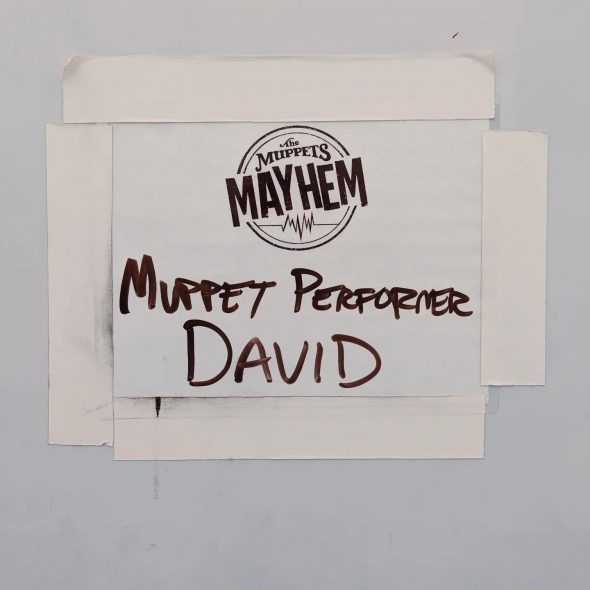
I was kind of giving up. I’d been pretty hurt by some folks in puppetry, and the pandemic had happened and I had gone through a miscarriage with my wife during the pandemic. It was really rough. I really just was having a weird existential moment where I was like, I don’t think I can do puppetry anymore. I don’t think I can.
That’s when I started teaching myself how to make clothes. What else can I do? I dunno. Teach myself to make clothes. I’m gonna start a clothing line! That’s what I decided.
Actually, do you mind if I share some stories about getting into the Jim Henson workshop?
TOUGHPIGS: Please.
DAVID: Because that is Muppet related. I can, a million percent, talk about that. When the call out for the auditions came up, I wasn’t going to audition. Because I was like, I’m not going to do puppetry. ‘Cause honestly, as wonderful as a lot of the puppeteers are, it can be very competitive. And it’s just like any performance realm, where you have some really lovely people and you have other folks, who can be very competitive and be mean. I was starting to feel unwelcome and part of that is my own stuff, but another part of that is the few people that are in the scene that are just kind of mean and not nice.
So I was pulling back. I was like, “I’m an artist and I’m not defined by any craft. I can do whatever I want to do.” So I’m just gonna be like, “Fine. If you guys want to have that thing and just be dorks and mean about it, fine. That’s fine. I’ll go be awesome at something else.”
That sounds really egotistical, but that was helping me cope. This call for the audition came around and my wife, she saw it first and was like, “Hey, a friend sent me this to send you. I know that you don’t want to be doing this, but you’re so talented and so good at what you do.”
I’m saying her words. I’m not saying what I believe, but she’s saying this to me and I was like, “But I don’t know.” And she’s like, “No, no listen. Just audition for it. Just do that. Just audition for it. Let it still be a part of your life because I know it makes you happy and you’re good at it. You should keep doing it and it would really make me sad to see you never do it again.”
I was like, “Okay, I’ll audition for it.” I honestly didn’t believe I would get asked to do it. Not that I thought they would like me. From past trauma, doing auditions as a young person, I hate auditions. I just never think that anyone’s ever gonna take me seriously. So I auditioned and got a callback and Cassie’s like, “Okay, you have to do the callback.” Because the call back was with Kevin Clash and [Puppet Up host] Patrick Bristow.
I was like, “Oh my god. I have to do this audition,” so I did the audition. What they wanted you to do was, I think they wanted you to perform a puppet and you do a character. And when I got on there, Kevin was on there. I had, of course, heard of Kevin. The person who mentored me in puppet wrangling, Michelle, was really close with Kevin, and Kevin even paid for her honeymoon.
She had learned a lot of what she knows from Kevin. She’s very particular about a lot of things that she does and the things that she does are really perfect and great because she learned them from a guy who really knows his stuff.
When I saw him, because they hadn’t talked in years, I said to him, I was like, “Hey, just so you know, I don’t mean to derail this audition or anything, but I learned how to puppet wrangle from Michelle. Michelle talks really highly of you.” And he was like, “Oh my god, Michelle!”
I was like, “Yes, she talks so highly of you.” I was sharing this stuff with him, and so it was just really cool to connect with him on this, really like not puppet thing, you know? Just real human moment. It was really nice. And then I auditioned.
What was cool was that this moment was really, this plus like getting to meet and learn from Bill Barretta, was really what brought me back to puppetry. Because I didn’t know what I needed was to be seen. That’s what I needed, was to be seen. When I performed, Patrick Bristow was there. I perform and he goes, “Okay, great. That was really good. That was nice.”
And then Kevin was like, “You know, I just want to take a moment and say to you, what you just did was really beautiful puppetry. It was really incredible. You know, the other folks on here can’t tell what you just did but what you just did was really difficult and I just have to tell you, I just have to acknowledge that what you’re doing is really great and you’re very good at what you do.”
I started to die a little bit. Here’s Kevin Clash saying this stuff to me and then Patrick says to me, “David, I know that you said you didn’t want to hold us up in the audition, but I’m gonna take a moment and I need to tell you to really savor this moment and be aware of what Kevin just said to you because Kevin does not compliment anyone.” And nobody laughed. It wasn’t a joke. It wasn’t like, “Hahaha, it’s so funny. He’s picking on Kevin.” Kevin just had a straight face.

Patrick was like, “He does not give out compliments like that. For him to say that, he really means it. You need to really take that and take it in. Even if we don’t call you to come do this, just know that he is regarding you and sees you.”
I was like, oh my god. And then I did another bit. And Kevin again, started saying really nice things about my character work and puppetry. I get off the call and I didn’t know what to do with myself. I laid on the floor because I was just completely overtaken by this feeling of joy and of being seen by somebody that I really looked up to as a performer.
Even when I watched Being Elmo, I was pulling notes that he was giving people and saying, “I need to remember that. I need to remember this.” There’s a specific moment where he says, “If you’re gonna have your puppet think, don’t put the hand on the head, make the head tilt down and then bring the hand up.” And I immediately was like, “Oh yeah, great.” And I took that and used it and when I would do it workshops, they’re like, “Man, when you’re thinking it really looks like your puppet is thinking!” And I’m like, “Heh heh, I took it from a documentary.”
So I’m laying on the floor and my wife comes in. She’s like, “What happened?” I told her exactly what Kevin said. And my wife just screams and she’s like, “This is amazing!” I was like, “I know. I don’t know what to do.” She’s like, “Let’s just sit here. Let’s just sit and enjoy this moment.”
And I got into the workshop. I flew out to LA and was in LA for three weeks, just doing puppetry. Patrick Bristow was teaching improv and Kevin was teaching choreography and puppetry. Donna Kimball was also teaching choreography and puppetry. I learned so much from that workshop.
There was a moment when I was performing and I get done and I come back, and we’re about to transition from classes, and Kevin was like, “Man. Yeah. What you’re doing today, it’s really good. Have you ever puppeteered on Sesame?” I was like, “No, no. I’ve wrangled a bunch.” I told him what I’d done. I thought that’s what he was asking, what my Sesame experience was. He’s like, “You ever puppeteer on Sesame?” And I was like, “No, no I never have. I’ve only done the wrangling.”
He’s like, “That’s dumb. That’s weird. I don’t get that.” And then he walked away. And I was like, “All right, Uncle Kevin. That’s weird.” And I’m not saying I agree with that sentiment. I’m just saying that… he was seeing me as a performer. And Peter Linz has been a mentor of mine for many years and has said a lot of really wonderful things to me. And I’ve gotten used to that, I think, of him being really lovely to me.
And Kevin is a performer who feels untouchable. He feels like having a conversation with Frank Oz. It’s just like, Frank Oz is even higher up on that level but I’m never gonna talk to Frank Oz. And Frank Oz is never gonna say anything nice about me. That’s what I thought about Kevin. I’m never going to meet Kevin Clash and he’s never going to say something nice about me because he’ll never meet me and that’s fine.
But then when he’s saying nice things about me, I really just always didn’t know what to do with myself. I was just like, I don’t know what to do with this information and I would just push it away and keep working is what I did. But I eventually also got to meet Bill Barretta and we had a conversation about how I was feeling about puppetry. And he was really listening to me, which is one of the really wonderful things about him as a person is that when you’re in the moment with him, he really engages with you and listens and is present with you.
I was telling him my story and about why I got hurt and what happened and I was leaving puppetry and even in the moment then I was like, “I still don’t know. Even with Kevin saying nice things to me, I still don’t know what I’m gonna do and if this is really where I want to be because I want to be performing at the highest level I can. But I don’t, I’m not competitive and I’m not going to kill myself trying to get on a TV show.”
It’s not that I don’t care enough for that, it’s just that I have no desire to compete with anybody on that. So if somebody else wants it, I will usually walk out of their way and let them do it because I just… I don’t know, not competitive, that’s what I’m saying.
He says to me, “Well, listen, when people are competitive with you like that, it’s often because they feel threatened by you. I’m not saying that you’re better than them. I’m just saying that they see you and your abilities and they feel threatened by that. That happens everywhere. No matter where you work. But you should keep doing what you’re doing because you’re good at it. Yes, don’t wait for the Muppets. Don’t expect to work on Sesame Street. Don’t expect to work at any of these places. Always be creating stuff for yourself. You’re already doing that. You can build puppets. You can shoot puppets. Keep doing that. You’re making stuff. Keep making things. But don’t for a second let somebody else take away the gift that you’re giving your audiences. Don’t do that.”
That moment with him right then was the turning point. That was literally like someone had grabbed the dial and turned it to ON. I was like, “Okay, yeah. I’m gonna keep doing this. I’m gonna get after it even if they never ask me to work on anything Muppets-related or Sesame-related. I am going to just keep doing it and keep working.” And it’s really been working for me so far.
TOUGHPIGS: My only other question was, are there any other kinds of projects or dreams that you would love to make happen someday?
DAVID: Yeah, a ton. I have so many ideas. But right now what’s really exciting is I’ve created a show with Steve Burns who is the original Blue’s Clues host. I’ve created a show with him that will be starring him and I and we’re working towards getting it out there in the world. That’s what we’re currently doing. It’s gonna be really fun.
I won’t be playing a puppet. I will be a human character and there will be puppetry. There’ll be animation and there will be stop motion animation. It’ll be a multi-media show that is based around these warm-blooded characters of me and Steve and a few other characters. It’s exciting. It’s a step into a form of children’s television that I think we don’t see anymore. Taking an approach to that medium and in a way where it’s not just for kids.
I know everyone says that everybody can watch it. It’s for everyone, but it really is… We really don’t want to make things super bright and crazy colors. We’re not gonna crank the saturation up. We want things to feel grounded, but we also want it to feel fantastic and full of joy and light, but also have darkness in it. Because that’s a part of our human experience is moments of sadness, and maybe grief.
We don’t want to depress people, but we want people to see how those moments, as difficult as they can be, can also be very beautiful. So that’s what I’m working on currently.
TOUGHPIGS: I am so excited about that. I have a deep and abiding, love for Blue’s Clues. And I’ve loved seeing what Steve Burns has blossomed into in his post-Blue’s Clues career.
DAVID: Yeah.
TOUGHPIGS: And to see all this wonderful stuff that he’s doing, so that is fantastic to hear.
DAVID: I’m so happy and proud for him. I’ve known him for a long time. I met him through the Flaming Lips. He’s really come a long way. Working for the show, he went through a lot of dark stuff, like a lot of folks do when they become a big celebrity. He’s grown so much. He’s also such a really amazing, beautiful human being and has helped me out a lot in my life as well.
I’m just so happy for him. That’s the thing that I can’t stop saying about him and to him: “I’m just so happy for you because everyone thought you were dead and would constantly say like, oh my god, aren’t you dead?” How depressing can that be? Literally, people would say that to his face like, oh my god, aren’t you dead?
“Like I’m literally standing right here.” “But I heard you died of an overdose.” “What do I have to do to convince you that I’m not dead? I’m literally standing in front of you?”
So I’m just really happy for him and I think that him doing even stuff on TikTok has shown that. And that Instagram thing that he did, the social media thing he did as Steve from Blue’s Clues, really shows, in my opinion, how bringing classic acting skills and methods to a character, to any character, no matter what they are, will be accepted by an audience so much more than if you just come in guns blazing, which a lot of people do when they’re doing a kid show. They just come in and it’s like, Dah bah dah badap zip zip zip zap.
But he told me when we were talking about it, he would say, because he studied [acting] at the same school I did. We both studied at HB Studio, which is Uta Hagen’s studio in New York. And he’s like, “I brought the same method there. I just believed that when I looked at the camera, I was literally looking at the person on the other side of it. And I just accepted that everything I was doing was a hundred percent real and grounded. I accepted that darkness in the character, and the reality and the humanity in them.”
That really comes through when you watch and perform. Even though there are moments that are silly and wacky and kind of weird. He brought his brilliant acting to that character and I think that’s what is made the character last so long.
TOUGHPIGS: Absolutely. Anything else you want to get to before we wrap up here?
DAVID: What I was gonna say was that — for folks coming up in puppetry, because I see a lot of folks that are doing puppetry online, and I think it’s great. I love what they’re doing. But what I would love for younger puppeteers and really just any puppeteer who’s trying to come up in puppetry is to not just focus on being a puppeteer.
I think it’s wonderful and awesome and do it, and that’s your passion and I love it. But also, take acting classes. Take dancing classes. Take a creative movement class. Take a singing class. Take a piano class. Not with the idea that you are going to be one of those things and one of those things is the new special skill you’re gonna bring to your puppetry, but all of those skills and techniques are going to inform you as a puppeteer.
Because even Doctor Teeth or Fozzie, they are mimicking human life and the human experience. That’s really what all of them are doing and you get there by bringing your acting skills.
If Kermit has to tap dance, how do you learn how to tap dance? You have to learn and know and understand how to dance. And that’s why that tap dancing sequence from the Muppet Show is mind blowing because they didn’t just say, “Oh yeah, it’s just gonna be this piston up and down up and down. Duh, duh, duh, duh, duh.
No, they took time to figure out where’s the weight? What are his hips doing? He’s not just going up now. It’s “happy feet.. Buh buh…” The elbow is changing the position of that and you see little tiny half beats happening within there as well.
The only way you get there is by studying those other art forms and understanding them. But that doesn’t mean you got to go out and do plays and go do dance recitals. It just means learn those. And it just surprises you. It comes through your puppetry in ways that you don’t expect.
This is something that Bill Barretta was saying, actually. That’s what I was trying to get to, is that he learned the Sanford Meisner technique, and he learned from Sanford Meisner in California. And he was always doing impersonations of him like Sandy would be there with a cigarette and saying, “Bullshit!”
The reason that Sandy Meisner would say that is because when he’s watching you perform, if he doesn’t see honesty coming through, he would yell bullshit, is what he would say.
TOUGHPIGS: I’m getting flashbacks to my theater teacher from high school.
DAVID: Yeah. Because it’s true. As an audience member, the moment you see something that’s not genuine and honest your mind immediately says bullshit and you disengage.
That’s why we love Steve Burns as the Blue’s Clues host. That’s why we really loved everything that was happening on The Muppet Show. And we love what all the Muppet performers are bringing to the characters now. And why Rosita is incredible. Because Carmen Osbahr also studied at HB Studio.
When I started studying there, I posted it on Facebook and she had sent me a message. It was like, “Oh my god, I studied there too. I am so proud of you for doing that. Not a lot of puppeteers will go and study at an acting school. Thank you so much for doing that.”
That’s why Rosita is so good, because she’s bringing honesty to the character and you won’t do that if you are doing all the typical stuff with your puppet. Which is, “Oh I’ve just said a thing. Hmm.” Or, I’m looking at you and I’m just gonna look you up and down and that’s me being engaged. How many times do you do that as an actual human being? You don’t really. Sometimes you go, “Oh, hmm, hmm, I’m proud.” But not all the time. I think it’s okay to do those things but only if they’re really genuinely motivated.
That’s one thing I wanted to say, because I know this is a site that a lot of puppeteers look at. I’ve been looking at the site for years and I love it dearly. I’m not saying that I don’t see acting in people’s puppetry, because it’s there. I just feel that that’s how you grow and sharpen yourself as a puppeteer.
Once you’ve hit a spot where you’re like, “I’ve learned all this technique. I don’t know why I’m not getting better.” It’s because you need to stop doing technique and you need to go do some acting or you need to do some dancing or something else and bring that to your puppetry. And that will make you just — chef’s kiss — so much better.
TOUGHPIGS: I love that. Thank you so much for sharing all of this with us today. It was such a joy to get to talk to you.
DAVID: This was a delight. Thank you so much.
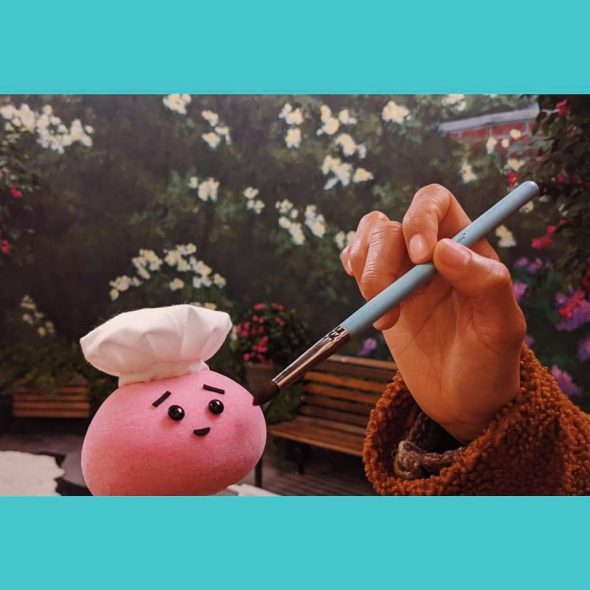
Click here to have a moment with a celebrity chef on the ToughPigs forum!
Interview by Beth Cook
Transcription by Katilyn Miller

